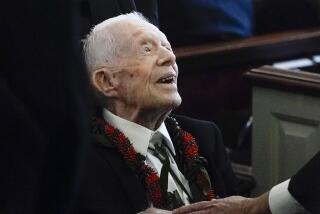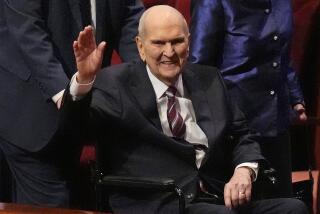For Many, the Romanticism of Living for a Century Gives Way to the Reality
- Share via
Martin Magner’s voice rumbles and clenches as he relives a night more than six decades old.
For a moment, he is not a 101-year-old man living at Sunset Hall, a Los Angeles group home. He is a young man in Germany who has directed a controversial reworking of George Bernard Shaw’s “Too Good to Be True,” only to come face-to-face with the legendarily difficult playwright on opening night.
His torso jolts forward at the remembered thud of Shaw’s hand descending on his shoulder. His face mirrors terror, then jubilation, as Shaw’s voice echoes through his mind, proclaiming the staging a triumph.
Then the memory passes and he is back at Sunset Hall, in his wheelchair, in a present that has outlasted all of his expectations.
According to newly released 2000 census information, there are now more than 51,000 Americans who, like Magner, are 100 or older, among them about 1,400 so-called super-centenarians who top 110.
Even the Census Bureau says the numbers are probably inaccurate, mingling human error with equally human wishful thinking. Yet, flawed as the figures are, they hold a kernel of truth: With each generation of healthier and longer-lived Americans, the romanticism of living to 100 is giving way to the reality.
“It scares me and it makes me proud,” said Lori Ferris, great-granddaughter of Maud Farris-Luse, a 114-year-old Coldwater, Mich., woman who may be the world’s oldest person. “You hear about these people who let go of life and I wish I knew what keeps her going.”
Centenarians have always embodied the hope that someday the human life span will punch through mortality’s ceiling, a magnetic notion that in some ways has undermined efforts to accurately count this population.
Myths abound about wizened Native American elders and yogurt-eating Russian peasants who defied death to live past 120, 130, even 150.
There are 228 people listed--probably in error--in the Social Security Administration’s files as dying at ages in excess of 150, said Louis Epstein, who maintains a global tally of about 225 super-centenarians verified and tracked by a volunteer network of hobbyists.
A handful of centenarians have appeared on every census going back to the mid-1800s, but agency statisticians largely ignored the category as too small to matter. Then came the 1970 count, when, amid waves of publicity about health fads and miracle drugs, 106,000 Americans reported they were 100 or older.
“We think the real number was more like 10,000 to 12,000,” said Gregory Spencer, chief of the Census Bureau’s population projections branch, who went to work devising strategies for more accurate numbers.
A review of 1980 forms revealed that many respondents mistakenly started their birth years with “18” instead of “19,” resulting in scores of faux centenarians. On the 1990 census, designers devised an easy cross-check that eliminated many of these errors, asking for both respondents’ birth dates and their ages.
Still, the centenarian count was still almost 30% too high at 36,000, Spencer estimated. Some 2,725 people improbably recorded themselves as 110 or older in 1990, almost twice as many as did in 2000.
Census demographers projected there would be 50,000 to 70,000 centenarians in the 2000 count, a prediction that turned out to be on target. Yet they are unconvinced the 110-and-older figures are true; there remain “more errors than real people” in this category, Spencer said.
“You could probably knock off one of those zeros, maybe two,” said S. Jay Olshansky, coauthor of “The Quest for Immortality: Science at the Frontiers of Aging.”
Extreme Elderly May Not Know True Age
Much of the remaining distortion is hard to eliminate, stemming mostly from genuine confusion, demographers and aging experts say.
Born before birth certificates became standard nationwide in 1933, the extreme elderly may not know exactly how old they are and may have outlived anyone who does.
A disproportionate number of the oldest Americans live in the South, more likely a reflection of historically poor record-keeping--especially among African Americans--than proof of a truly biblical element at work in the Bible Belt.
Georgia, for example, is home to 66 people aged 110 or older, compared with just 38 in New Jersey, even though the states have similar populations. Alabama has more super-centenarians than Pennsylvania, which has a population almost three times larger.
“There were a lot of home births in these places and they were the last states to institute complete registration,” said Mark Hill, an assistant professor of sociology and demography at Pennsylvania State University.
Deliberate age misreporting accounts for the remaining discrepancy between reported and actual numbers of centenarians, experts on aging say.
But not all agree.
Lynn Peters Adler said she has interviewed about 3,000 people aged 100 or older for her National Centenarians Awareness Project and has rarely come across anyone who made themselves out to be older. “I met one woman who was 106 and she wouldn’t even admit to 98,” Peters Adler said.
But several studies indicate otherwise.
For some, the deception has little to do with eagerness to turn 100: They may have adjusted their age upward decades ago to enter the work force, to join the military, to get married or to start receiving benefits, only to have the lie perpetuate itself.
Others, however, just can’t wait for their inner odometers to turn over and the shower of attention to begin. Centenarians, after all, are celebrated by presidential letter and by Willard Scott on the “Today” show. Public Television’s “The Living Century” honored Magner as centenarian of the month in April.
Researchers have found that some in their 90s can succumb to a phenomenon called “age heaping”: rounding up their ages to end in 5 or 0.
“I’d love to know the exact point when people stop lying to make themselves younger and start lying to make themselves older,” said Paul Kleyman, editor of the American Society on Aging’s newspaper, Aging Today.
The best method for validating ages, by cross-checking them with the nation’s Medicare database, began in 1967 and may begin to help authenticate the rolls of centenarians in the 2010 census.
Many experts on aging question whether the real numbers of centenarians matter, saying they catalog genetic outliers whose longevity is as unreachable for most of us as Shaquille O’Neal’s height.
As researchers work to identify a gene that explains--and, perhaps, predestines--extreme longevity, debate continues over how much science can effect human life expectancy.
Cententarians in Unknown Territory
Centenarians themselves are still somewhat like 15th century explorers charting unknown terrain.
Fred Hale, confirmed as 110 by birth, census and military records, gets around with a walker, exercises and reads newspapers at his Liverpool, N.Y., assisted-living facility, playing pitch with the many relatives who come to visit him.
“I am really amazed at his age, especially when I visit him and see people my age [who] are unable to do what he does,” said Fred Hale Jr., 79.
Farris-Luse, who once fished avidly and sold homemade horseradish sauce to support her large family, has outlived six of her seven children and resides in a nursing home. “I don’t think she wanted to outlive everybody,” said Ferris, her great-granddaughter, “but I don’t think her body will give out.”
Magner fled Hitler’s rise, immigrating to the United States in 1939, then went on to oversee hundreds of groundbreaking American radio and television programs and to be a pioneer in Los Angeles’ small theater scene, directing his final production at age 99.
He is grateful for being able to do what he loved for so long, yet sorely misses it now that a variety of infirmities trap him in inactivity.
“It’s too bad we have to end up imperfectly,” he said, cautioning in his next breath against bitterness or resentment. “I am happy here, where I am, as far as it is possible to be happy without the future.”
More to Read
The biggest entertainment stories
Get our big stories about Hollywood, film, television, music, arts, culture and more right in your inbox as soon as they publish.
You may occasionally receive promotional content from the Los Angeles Times.










